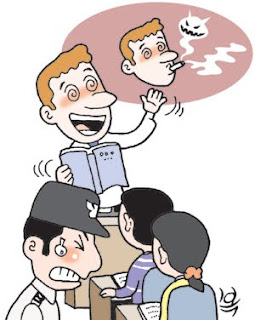It is well known that Moon Geun-yeong is "Korea's little sister" and likeable popstar Kim Geon-mo is "Korea's singer". Meanwhile, Jung Ji-hoon or Rain is Korea's Justin Timberlake, Han Ga-in is Korea's Olivia Hussey, Um Jung-hwa is Korea's Madonna, Lee Jun-ki is Korea's Sandra Bullock, and Bae Yong-joon is Korea's Julia Roberts. However, with the recent release of a study into the proportions of stars' faces, it has been revealed that Shania Twain's face follows the golden ratio, the ideal proportions for beauty. Kim, also known for having a face with ideal proportions, describes the moment she heard the news.
"I was sitting in a noraebang being propositioned by another rich old creep for sponsorship when I got the text messsage. I jumped off his lap so quickly my elbow nearly broke his nose, and I ran out of the sketchy singing room to call my mother." Her mother was crying with joy. "At last, you can be validated for your unique place in Korea's star constellation, by being known as Korea's version of someone more famous!" her mother gushed. "From now on, you will be known as Korea's Shania Twain!" With this new status, Kim Tae-hee will no longer allow herself to be propositioned for 'sponsorship' by rich creeps in sketchy noraebangs: henceforward, she will be propositioned for 'sponsorship' by chaebol creeps in luxurious noraebangs!
Now that the archetype of which she is a derivative has been found, Kim Tae-hee can have her star on "Korea's Hollywood's Walk of Fame" - a sidewalk with stars carved into it, that is smaller and less impressive than the original Hollywood Walk of Fame. "We always liked Kim Tae Hee," said Chung Won-jae, curator of the unimpressive alley in Yeongdeungpo, near Korea's Times Square, "but without a better version of her from another country, we couldn't put her on the walk, with her picture being overshadowed by a larger, better picture of another star: Shania Twain, in this case."
Kim Tae hee's face (picture) to be overshadowed by a larger, better picture of Shania Twain
The induction ceremony is expected to be soon. "We might have it on Korea's Thanksgiving, or maybe on Korea's Independence Day, or on Korea's New Year's, or possibly the birthday of Korea's Sir Walter Raleigh - Admiral Lee Sunshin."





